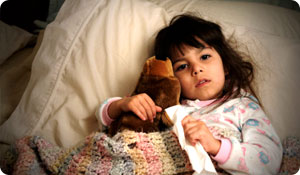
Every fall or winter, your child probably comes down with the same type of symptoms: sneezing, coughing, aching bones and a fever. And each time you may be left wondering if it is a cold or flu. Telling the difference can be very hard to do.
The Similarities
A cold and the flu (also known as influenza) can present themselves in almost the same way. Both are respiratory ailments and both can cause similar types of illnesses.
But while there is much overlap in both cold and flu conditions, the course of each can be very different, too. A cold usually poses few risks, while a flu has the potential to become much more serious (although rest assured that most children without other health problems usually recover quickly and without lasting effects). Further, this year, there is also increased concern about the spread of the Swine Flu.
To help ease your mind next time your child is sick, it can be helpful to try to know how to read some telltale clues that can distinguish if it is a cold or flu.
Severity of the Symptoms
Doctors say that as a general rule of thumb, you can expect that colds will come on more slowly, sometimes starting with a sore throat and sneezing before the symptoms progress into more pronounced nasal symptoms, like a runny nose or severe head congestion. This can make your child cranky and miserable but the symptoms are still much milder usually than you would typically expect with a flu.
A flu, on the other hand, can come on very suddenly and is usually accompanied by a dry cough, high fever, exhaustion, severe body aches and lack of appetite. The Swine Flu can also cause stomach distress, too.
In addition to making someone feel very sick, a child with the flu (whether it's Swine or some other type) can be at risk for complications, such as bronchitis, pneumonia and other bacterial infections.
Treatment Options for a Cold or Flu
Whether your child has a cold or flu, there is usually not much you can do to make it go away faster. In the case of the flu, sometimes an anti-viral medication can be an appropriate approach to help keep the illness from progressing into a more serious case, but beyond this, there is little you can do to speed up the course of your child's sickness.
You can take some steps to try to ease some of your child's discomfort, though.
Talk to your pediatrician about the most appropriate form of symptom relief you can offer your child. Usually plenty of rest, lots of liquids and hugs and comforting can help your child to cope with the aches and pains and feel better fast.
Other Illnesses
If the cold or flu symptoms don't seem to be resolving on their own, or are getting worse, you should have your child see the doctor as soon as possible, In addition, if your child has a severe sore throat, bad cough or particularly painful headache, you will need to rule out any other ailments that could need to be treated, including strep throat, bronchitis and a sinus infection.
Sources: American Lung Association http://www.lungusa.org/site/c.dvLUK9O0E/b.23161/k.65FD/Cold_and_Flu_Guidelines.htm Centers for Disease Control and Prevention (CDC) http://www.cdc.gov/flu/about/qa/coldflu.htm Kids Health (Nemours)





